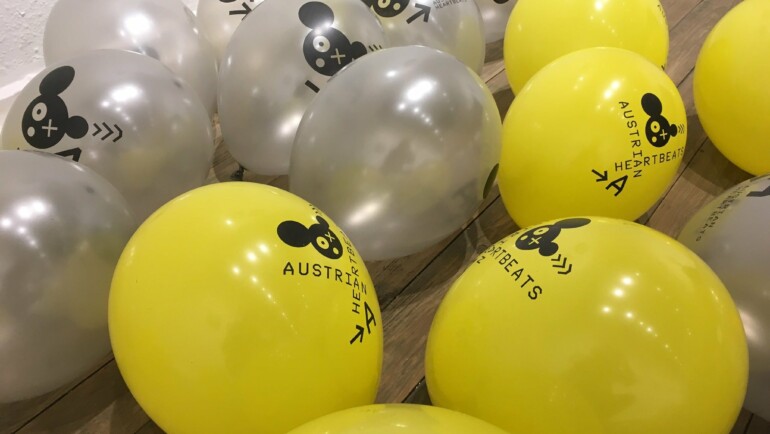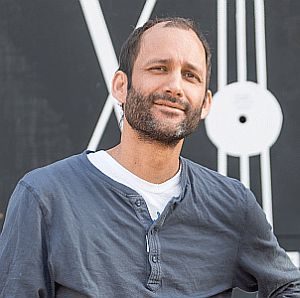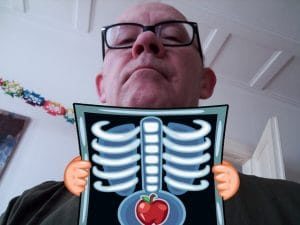
A decade is coming to an end. On this occasion we wanted to ask Austrian musicians, music managers, promoters and festival organizers about their personal highlights of the last ten years and also about how the overall conditions of their work have changed.
HANNES TSCHÜRTZ (Ink Music)

What were your personal highlights of the last ten years (e.g. concerts, releases, tours, meeting fans, special projects)?
In the end, it is all about those moments when a lot of stuff comes together and is right on the spot. And if I may restrict this to the business context, there were fortunately many moments when you get the feeling that you are now part of a lasting story. Bilderbuch’s first Arena Open Air was undoubtedly something like that. The ensemble concert of Farewell Dear Ghost at Acoustic Lakeside 2018 was something like that. The Garish concert at the Innsbruck Weekender, which was one of the very last ones there. Yasmo’s performance with the Klangkantine and a huge female choir at the Amadeus. The very first C’est la Mü Festival at the Cselley Mühle… thankfully the list is long!
Do digitalization and the resulting changes in listening behavior have an influence on your production?
Of course this has an impact – whether we want it or not. We hold the album format up high with enthusiasm, but the way it is thought, produced and marketed has changed.
Which challenges do you face as a musician/music producer today in contrast to the past? Could you name them?
The economics of the business was and is the biggest challenge – in other words: being able to afford to do what you do. This is not getting any easier as the market develops: Everything is becoming more international, more global; and with it, the pressure, the expectations and the need to go out there are also increasing. This in turn costs more money and time and increases the risk. It is not getting any easier.
Can you name three releases of local acts that have particularly influenced you in the last ten years?
Oh, only three?
Without “Schick Schock” by Bilderbuch (Maschin Records, 2015) the Austrian music landscape would not be what it is today.
Without “Wenn dir das meine Liebe nicht beweist” by Garish (Schoenwetter Schallplatten, 2010) with all its timeless classics, the band and the company would probably have gone in a different direction.
Without “Sauna” (Leyya, Las Vegas Records, 2018) many windows and doors wouldn’t have opened and we all would not have had some adventures.
Looking back, however, there has been such an immense density of high-class productions – those in which we as a company were somehow involved and also far beyond – that without a doubt ten years ago nobody would have suspected it.
JULIA LACHERSTORFER (Alma, Ramsch & Rosen)

What were your personal highlights of the last ten years (e.g. concerts, releases, tours, meeting fans, special projects)?
The most elaborate, intensive, but also most delightful was certainly our latest production “Cherubim”.
My most special concert experiences with ALMA in recent years have been:
The opening of the Wiener Festwochen 2018, the opening of wellenklænge at Lunz am See 2018, the “Cherubim” premiere at the Vienna Musikverein 2019.
But often there also are those small moments in which you feel that you are in resonance with the place and the audience. With the wellenklænge at Lunz am See I feel this very strongly, both as performer and as listener.
Very exciting and touching for me was also a small “Stubenkonzert” with live recording with my solo project “Spinnerin”. There I just feel very naked and vulnerable, and it was very special and especially nice to play for a few neighbors and family.
Do digitalization and the resulting changes in listening behavior have an influence on your production?
Actually, not that much. It has an influence on my own listening behavior, but not so much on my production of phonograms, because our listeners still buy surprisingly many CDs.
Which challenges do you face as a musician/music producer today in contrast to the past? Could you name them?
My own standards have increased, that is the biggest challenge.
Can you name three releases of local acts that have particularly influenced you in the last ten years?
Schmieds Puls – „Play Dead” (JazzWerkstatt Records) / Lotus Records, 2013)
Strottern & JazzWerkstatt – „Elegant” (JazzWerkstatt Records, 2009)
Soap&Skin – „From Gas to solid” (Play It Again Sam / Rough Trade, 2018)
WALTER GRÖBCHEN (Monkey Music)

What were your personal highlights of the last ten years (e.g. concerts, releases, tours, meeting fans, special projects)?
The revival of the “Schallter” label which was already an important, tasteful and accurate biotope in the 1980s. With this adventure playground, we have broken away in a loose way from the fashion dictates of the FM4-hype-machinery and mainly are doing what we enjoy. For example reissues of historical treasures – from Hansi Lang to Drahdiwaberl, from Werner Pirchner, Sigi Maron and Karl Ratzer to Rosachrom. In the future, I’d like to go beyond the borders – I’m currently negotiating a live edition of the legendary Fehlfarben album “Monarchie & Alltag”. In addition we have remarkable new productions (e.g. by Sir Tralala or The Trojan Horse), compilations, special vinyl editions (e.g. an opulent Attersee box), limited singles for collectors and so on. The fact that at the same time we have opened up a “Schallter” record store makes it all even better.
Do digitalization and the resulting changes in listening behavior have an influence on your production?
Not to the extent I expected. We ultimately produce – with a few exceptions – music for adults who still appreciate the album format and physical recordings. Digitalization, whose dubiousness now exceeds the promises made, is building an economic framework that brings everything into one line and formats everything – from the product, its promotion and distribution up to its reception. The great streaming Shangri-La? I actually find that extremely boring.
Which challenges do you face as a musician/music producer today in contrast to the past? Could you name them?
The upheavals of the coming years will be enormous. On the surface, everything is becoming easier – from production in the living room to music distribution at the click of a mouse – behind the scenes, everything is becoming more complex, bureaucratic and unmanageable. The future belongs to the individual artist who opens the laptop somewhere on this planet. Copyrights are clearly assigned to the copyright holders. “Middle Men” are being dropped, copyright societies are expanding their field of activity and offer e.g. digital distribution (example: GEMA), booking & live business is now firmly in the hands of international corporations, the major companies will either have to reinvent themselves (example: BMG) or will become massively involved in court cases about the validity of old contract models in the new business context (keyword: revenue shares in digital distribution). Indie labels are and remain sentimental relics, lovers’ biotopes and small-family substitutes. Blockchain technology, Smart Contracts and Big Data are becoming everyday phenomena. Even the attempts to get a grip on reality with legal frameworks – EU copyright directives, copyright contract law, etc. – will not diminish. Let’s see how that will work.
Can you name three releases of local acts that have particularly influenced you in the last ten years?
On the one hand, there is the “New Austropop” triptych Wanda/Der Nino from Vienna/Voodoo Jürgens – they are all acts that the manager Stefan Redelsteiner has jazzed up in a furious way. Hats off! The fact that he lost some feathers regarding his label and management portfolio doesn’t seem to bother him more than that. This standing up again & carrying on reflex is a local phenomenon. I am also thinking of Hannes Tschürtz (ink Music) who has lost Bilderbuch, Ja Panik and Cari Cari, but still keeps his course. He has a new star in his management portfolio, Mira Lu Kovacs, who shines in acts like 5K HD – whose debut album I find terrific – or My Ugly Clementine. In general, it’s probably releases by all the above-mentioned acts that have shaped the decade. Less subjectively but more objectively, we helped Ernst Molden to get his breakthrough – he just lacks the attention of radios like Ö3 & Co. to become a saint to the people. The album “Ho Rugg” (Monkey Music) with Willi Resetarits, Walther Soyka and Hannes Wirth, released in 2013, is my personal highlight of the decade.
STEFAN REDELSTEINER (manager)

What were your personal highlights of the last ten years (e.g. concerts, releases, tours, meeting fans, special projects)?
My gold records, my platinum records and my double platinum records.
Do digitalization and the resulting changes in listening behavior have an influence on your production?
Not really; I try to keep my acting from being as little as possible dependent on external circumstances.
Which challenges do you face as a musician/music producer today in contrast to the past? Could you name them?
Always the same; find good, distinctive acts and then take them to the gravy.
Can you name three releases of local acts that have particularly influenced you in the last ten years?
Der Nino aus Wien – „Down in Albern” (Problembär Records , 2010)
Wanda – „Amore” (Wandamusik / Rough Trade, 2014)
Nockalm Quintett – „Zieh dich an und geh” (Koch Music, 2011)
UTE PINTER (open music)

What were your personal highlights of the last ten years (e.g. concerts, releases, tours, meeting fans, special projects)?
To be honest, there were fortunately far too many to list here …
Do digitalization and the resulting changes in listening behavior have an influence on your production?
Yes, I continue to rely on the power of immediacy of live concerts!
Which challenges do you face as a musician/music producer today in contrast to the past? Could you name them?
Pseudo “complexity” within the abundance of tasks.
Can you name three releases of local acts that have particularly influenced you in the last ten years?
See question 1
HERWIG BAUER (poolbar-Festival)

What were your personal highlights of the last ten years (e.g. concerts, releases, tours, meeting fans, special projects)?
At the poolbar-Festival 2018 an evening with a Pergolesi-Stabat-Mater version by Gerald Futscher, composed especially for the 25th anniversary of the poolbar-Festival, staged as “New Music” with aquariums in the pool together with Ensemble Plus and a choir and performance team of students from the neighboring school (BORG). It was so beautiful, you could just cry. And afterwards: The Eels in the packed hall.
The performance of Voodoo Jürgens at the Amadeus 2018, before and after: Glamour and bombast, a desperate struggle for attention. Only at the Voodoo performance: A real human being. And calm.
The exhibition/staging of Ragnar Kjartansson at the TBA21 in the Augarten in Vienna. Very touching.
Do digitalization and the resulting changes in listening behavior have an influence on your production?
If you consider the poolbar festival as “production”: yes, massively. The relationship between musicians and audience is becoming faster and more superficial. All the music on offer is so huge and easily accessible that fewer and fewer fans really dig into the depths of a musician’s art. You switch from hit to hit. We try to counteract this, we don’t necessarily try to chase after trends, yet we try to make programs that don’t leave anyone present unaffected. By the way, also with selected good support groups. And a well-designed ambience anyway – that’s our super trump card.
Which challenges do you face as a musician/music producer today in contrast to the past? Could you name them?
Maybe it simply has to do with the professionalization of the poolbar festival, but I have the strong impression that the “music scene” is more and more becoming a “music business”. While 20 years ago a lot was more modest, undefined, human, today often all is subordinated to money and career. I’m not nostalgic about the “good old days”, because to a certain extent this development was overdue, especially in Austria. And the really good bands from Austria don’t twist themselves artistically because of it, but still remain very “peculiar”, yet they are more professional, more determined – and therefore also more competitive on an international level. But in general, the (expected) fees are sometimes reaching grotesque heights. Especially London booking agencies tend to demand tens of thousands when a young band has sold out 3 village pubs and has been praised in the NME. So the challenge might be to distinguish between evermore audacious marketing scams and really good music. Because live there’s no way to cheat anymore.
Can you name three releases of local acts that have particularly influenced you in the last ten years?
Naked Lunch: Already with “Songs for the Exhausted” (Motor / Universal, 2004) I thought: Wow – if Radiohead would do something like that, the whole world would hear it. The same with “This Atom Heart of Ours” (2007). For me a kind of pioneer of the current wave of really good Austrian music. At that time the label “Austrian music” was unfortunately still more a disadvantage than an advantage. Naked Lunch have helped a lot to change that.
Leyya: “Spanish Disco Deluxe” (LasVegas Records, 2016).
Farewell Dear Ghost: “We Were Wild Once” (Ink Music, 2015). Perfect song. I’ve probably heard it more often than anything else in my life – because our now 8-year-old son loves it and has listened to it day and night, at times.
SABINE KRONOWETTER (PR)

What were your personal highlights of the last ten years (e.g. concerts, releases, tours, meeting fans, special projects)?
At this point I don’t want to talk about specific individual moments, but about a general phenomenon that has changed our entire music industry: The growth and regained importance of the brand “Music Made in Austria”. This has changed/improved massively over the last 10 years. In the beginning, there were only a few bands fighting – and by God, they had a hard time – but now you can go fishing in a huge lake where everybody has found his place. The potential was of course there before, but there was a real explosion of creative bands and musicians about 10 years ago. As a result, the domestic media & promoters have changed their focus again, domestic music has regained its importance and the music makers have grown closer together. We have a great diversity of which we can be proud. THIS is THE highlight of the last 10 years for me!
Do digitalization and the resulting changes in listening behavior have an influence on your production?
In any case, the listening behavior has an influence on my work. Everything happens much faster, people come into contact with new music in a much less complicated and much faster way. Of course you have to be very fast in everything yourself. Basically I see that as very positive, but it also has its pitfalls … see next question.
Which challenges do you face as a musician/music producer today in contrast to the past? Could you name them?
These days we have unlimited resources. It is much easier to produce and publish music. Countless new bands/projects are emerging. This makes it all the more difficult for the consumer (and also for organizers and media partners) to filter. Tons of streams & downloads. How to find the right choice quickly? Labels and also PR people are all the more challenged. But also the musicians: Individuality is more in demand and more important than ever.
Can you name three releases of local acts that have particularly influenced you in the last ten years?
Soap & Skin – „Lovetune for Vacuum” (PIAS, 2009)
Fennesz – „Bécs” (Editions Mego, 2014)
Garish – „Trumpf” (Schoenwetter Schallplatten, 2014)
PETER ROM (Musiker, Jazzwerkstatt Wien)

What were your personal highlights of the last ten years (e.g. concerts, releases, tours, meeting fans, special projects)?
2014: “We Share a Decade” A common concert by JazzWerkstatt Wien and Affine Records (Dorian Concept, Cid Rim, Wandl) at Brut in Vienna.
2016: Rom Schaerer Eberle at the Inntöne Festival
2019: Synesthetic4 “Pickedem” CD presentation at the Vienna Konzerthaus
Do digitalization and the resulting changes in listening behavior have an influence on your production?
Digitization has a great influence on the recording process: you can prepare and edit, select, etc. much more at home than before.
What has also changed is that almost every production now includes a video. All in all, work has increased, but as a musician you have more impact on all aspects of production.
The changed listening behavior enters my mind rather subconsciously…
Which challenges do you face as a musician/music producer today in contrast to the past? Could you name them?
After the technical developments over the last years, there’s (at least as a perceived reality) the possibility for each individual to place a musical product, a piece of art, even if it is a niche product, on the market. With the “democratic” Youtube principle, more clicks yield more relevancy.
A challenge might be to consciously deal with the difference between “works” with, for example, an important artistic and emotional depth, and marketing, which is about generating attention quickly and encouraging purchase.
Can you name three releases of local acts that have particularly influenced you in the last ten years?
Flower – „Flower” (Freifeld Tonträger, 2010)
Koenigleopold – „Eure Armut kotzt mich an” (JazzWerkstatt Records, 2013)
Monophobe & Karma Art – „Gumm EP” (Prrrrrrr Records, 2017)
KERSTIN BREYER, LELO BROSSMANN (Wohnzimmer Promotion)

What were your personal highlights of the last ten years (e.g. concerts, releases, tours, meeting fans, special projects)?
Our personal highlight this year was the participation of PAENDA at the Eurovision Song Contest. We didn’t win anything, but for us it was all about the Olympic idea: the possibility to be there on site and to experience this spectacle “from the inside” was an exciting experience.
Do digitalization and the resulting changes in listening behavior have an influence on your production?
The sales figures in physical distribution are steadily decreasing, therefore we mostly produce smaller editions, but the approach has not changed. For us, the album as a complete package is still the central product and we still think in album cycles, both in terms of planning and promotion.

Which challenges do you face as a musician/music producer today in contrast to the past? Could you name them?
In the social media age, it is hardly possible to do without artists marketing themselves. Posting five Instagram stories a day isn’t for everyone, but at least some activity and presence away from concert stages and interviews certainly doesn’t hurt.
Can you name three releases of local acts that have particularly influenced you in the last ten years?
„Schick Schock“ by Bilderbuch (Maschin Records, 2015) and „Amore“ by Wanda (Wandamusik / Rough Trade, 2014) are for sure the two most essential albums in recent years, because they have catapulted Austria back onto the pop map.
WOLFGANG MÖSTL (Mile Me Deaf, Melt downer)

What were your personal highlights of the last ten years (e.g. concerts, releases, tours, meeting fans, special projects)?
I did a recount recently and since 2010 I’m mentioned in the credits of 76 musical releases. There are already countless highlights only in the releases. Actually, the last ten years have been one music highlight for me. I started the decade with a move to Vienna, which in itself was already great, but I also met many new fantastic people here, who positively influenced and shape my life. I was able to play hundreds of concerts in Europe and the USA and met an endless number of friendly people. There were some great creative projects I was involved in and I was able to leave my comfort zone non-stop. All in all, those ten years have given me a lot, for which I am grateful, that simply was my decade. (laughs)
Do digitalization and the resulting changes in listening behavior have an influence on your production?
In my own music, the influences have in any case increased exponentially. Not that I didn’t already suck up mp3s in 1999, but over the last years I got to know and love so much old and new obscure stuff. On the one hand it was very hard to get hold of certain things until recently, on the other hand there are just sooo many good acts who put their stuff on Bandcamp, etc. Now all this flows somehow into my creative work. While before it used to be a handful of bands and records that influenced an album, it’s now a whole digital megastore.
Which challenges do you face as a musician/music producer today in contrast to the past? Could you name them?
On the one hand, it is of course more difficult to make yourself heard with the countless releases that come out every day. On the other, there’s a digital infrastructure and audience for every niche. For me, the question about my own genre used to be a hellish one, which has changed. In the meantime it is relatively important for me to know where the respective music could function and be accepted.
Can you name three releases of local acts that have particularly influenced you in the last ten years?
From the following three releases I have borrowed ideas again and again – thanks, kisses.
Leyya – “Sauna” (Las Vegas Records, 2018)
Eternias – “Sould Out” (Seayou Records, 2012)
Gitarren der Liebe – “How i failed to trick my destiny” (Numavi Records, 2016)
SUSANNE KIRCHMAYR (ELECTRIC INDIGO)

What were your personal highlights of the last ten years (e.g. concerts, releases, tours, meeting fans, special projects)?
Various projects with Pia Palme since 2007
Outstanding Artist Award – Music 2012
World premiere of “Chiffres” at Wien Modern 2012
First female:pressure FACTS Survey 2013 and its consequences
Debut album release on Imbalance Computer Music 2018
DJ set at the Freedom Festival Medellín 2019
Mexico/Honduras tour with resom 2019
Do digitalization and the resulting changes in listening behavior have an influence on your production?
Not the listening behavior, but the increasingly powerful computers definitely do. My way of making music has completely shifted into the digital domain over the last 10 years.
Which challenges do you face as a musician/music producer today in contrast to the past? Could you name them?
The first negative thing that comes to mind is that it’s quite exhausting to devote yourself to your social media profiles and to act as you are told you should. I can only ignore that and try to remain authentic. Part of the latter is not always wanting to post something …
Apart from that, I believe that the scene has become more interesting, more diverse and more accessible and, assuming you can and want to perform and travel as a musician (this includes privileges such as the right passport, for example), a lot has changed for the better. Of course, I can easily say this because I had no substantial income from music production before. In fact, that has increased, since it has to do with my artistic development.
Can you name three releases of local acts that have particularly influenced you in the last ten years?
Chra – „Empty Airport” (Editions Mego , 2015)
Ventil – „Ventil” (Ventil records, 2015)
Katharina Ernst – „Extrametric” (Ventil Records, 2018)
Fennesz – „Agora” (Touch, 2019)
Pita – „Get In” (Editions Mego, 2016)
OLIVER JOHNSON (DORIAN CONCEPT)

What were your personal highlights of the last ten years (e.g. concerts, releases, tours, meeting fans, special projects)?
That I didn’t have to compromise and could do what I wanted to do. Hopefully for ten more years!
Do digitalization and the resulting changes in listening behavior have an influence on your production?
I don’t think so – and it wouldn’t do my music any good either. I think that in such cases I always look for ways out rather than dealing into habits.
Which challenges do you face as a musician/music producer today in contrast to the past? Could you name them?
I think the biggest challenge is to continue to surprise myself in my creative process.
Otherwise, yes – there are simply many more people making electronic music now. “Getting through” might become a little bit more difficult.
But on the other hand, I believe there is more room for “being different”.
Can you name three releases of local acts that have particularly influenced you in the last ten years?
Spontaneously, now, that’s rather difficult for me to say, but what is happening around the JazzWerkstatt Wien is very inspiring to me.
BERNHARD FLEISCHMANN

What were your personal highlights of the last ten years (e.g. concerts, releases, tours, meeting fans, special projects)?
Fortunately there were many highlights.
Concerts for example: Finally to see LCD Soundsystem at the Primavera Festival – I stood next to the stage one hour before the concert started, to experience it on this huge stage – I had goose bumps … at the same festival I also saw Brian Wilson – also there lots of goose bumps.
I also remember very vividly a surprise concert at the Donaufestival in the Kesselhaus cinema a few years ago – Peter Kutin played there with a project – that really thrilled me. The first Caribou concert at the Arena a few years ago was also quite a highlight for me – the concerts by the band afterwards were far less intoxicating for me – everything was too structured for me and the “free” and rhythmically wilder passages from the Arena were only present in homeopathic doses (for me).
As a festival, the “Alien Disco” has offered me the most amazing musical surprises in the last 4 years – I don’t know any other festival that spans such an exciting arc between quiet songwriting and ecstatic jazz to punk and electronics – not one edition where I didn’t have at least two total “WOW” experiences, simply THE festival of music fans for music fans across genres.
As a musician, the joint concert with Daniel Johnston in the Arena was certainly an absolute highlight – thanks again to Andi Dvorak for putting together the backing band!
The film award for the music for “L’Animale” was of course also nice, but working on the music with the whole team was at least just as fine.
As b.fleischmann, the release of the somewhat lengthy and not always easy work on “Stop Making Fans” was certainly special, and here too, I am lucky to be able to make music with Gloria Amesbauer, Markus Schneider and Valentin Duit, with such special people.
Otherwise, every project I am working on is always a highlight, since I am trying to only accept things that I have the feeling could become one.
Working with Jochen Irmler at Faust Studio Scheer for Villalog was extremely great!
AND: helping to organize the Signale Festivals and seeing that there are also many young people who care about other people. . .
Do digitalization and the resulting changes in listening behavior have an influence on your production?
No – I’m still working as I did 25 years ago. I’m trying to tell a story while working on an album and thereby I’m always thinking in terms of an album format. The tendency is that my songs and my albums are always too long – at least I often got the feedback – “Sorry too long for radio”. . . “Sorry, too many songs for one album – please shorten it.” Although I personally still like the long pieces very much – I don’t think I’m going to start now releasing each album twice (1x with vocals, 1x instrumental), as it seems to be done now to have long playlists – for me a piece either has vocals or not.
Which challenges do you face as a musician/music producer today in contrast to the past? Could you name them?
It is true that I am now working more with my head than I did 20 years ago – like: “Am I repeating myself?” – “I’ve had that once before”… resp. it takes longer for me to be sure that something I have written or recorded is really good for me. You could put it this way: if you have told a lot of stories already, you have less characters for new stories to choose from. . .
At the same time it doesn’t get any easier to get concerts, firstly because b. or b.and fleischmann is not the latest “hot shit” anymore – and secondly because there are so many good, exciting new acts where promoters can be sure to have a sold out venue. Of course, more bands are trying to play live, because the income from recordings usually doesn’t cover the production costs by far and therefore the releases are often expensive business cards to play at festivals or similar places.
But all in all I fortunately can’t complain and I don’t want to be grumpy at all – I’m lucky that people at the theatre and in movies care for my music and thus I get to be part of exciting projects there and we actually played more last year as b.and fleischmann than I initially expected – which makes me very happy!
Can you name three releases of local acts that have particularly influenced you in the last ten years?
Not really. For one thing because I heard or got to know most of the music that influences or has influenced me in the years before.
It’s true that over the last few years less music has surprised me as much as in my 20s.
Furthermore, I find it difficult to classify music geographically and chronologically. And on the other hand I don’t want to give answers here to make someone happy or to please… therefore unfortunately no – BUT I have heard great concerts & records by:
The Boiler
Andreas Spechtl
Markus Schneider.
HERBERT MOLIN (PROMOTER)

What were your personal highlights of the last ten years (e.g. concerts, releases, tours, meeting fans, special projects)?
Lingua Ignota, Author & Punisher, Odes (Ted Milton), Street Sects, Matt Elliott – from the stuff I organized myself.
Do digitalization and the resulting changes in listening behavior have an influence on your production?
Actually less so, you just have to get used to other sources of information, but that has been the case for quite some time.
Which challenges do you face as a musician/music producer today in contrast to the past? Could you name them?
Since I am neither a producer nor a musician, I can’t really answer the question… Just this much: due to the incredible amount of events in Vienna it is getting harder to halfway assert oneself with niche events, even in social media and media in general.
Can you name three releases of local acts that have particularly influenced you in the last ten years?
The Boiler – „Body=Death” (Cut Surface, 2018)
Lady Lynch – „Lady Lynch” (Cut Surface, 2018)
Schrecken & Bernhard Bauch – „Schrecken & Bernhard Bauch” (Ventil Records, 2018)
Alfred Pranzl (SKUG)
What were your personal highlights of the last ten years (e.g. concerts, releases, tours, meeting fans, special projects)?
I don’t necessarily want to unravel this with individual examples. In my opinion, in the years after 2010, no newly formed international rock band appeared that could fill the stadiums. Rock is dead, and yet it still celebrates happy old times in a smaller format. In order to set high domestic standards: regarding Wanda or the musically much richer funky Bilderbuch. Or the rampant scene that revives the Viennese song in the broadest sense, with Voodoo Jürgens as spearhead. Hip-hop and electronic music forms have replaced rock, and of course it’s not women-despising rappers that are among my favourites, but Kendrick Lamar, for example, who with “To Pimp a Butterfly” has delivered the epoch-making album of the decade. Against racism, deeply rooted in Black American Music. Indietronica is a thing of the past, the future belongs to Conceptronica or post-dub-step acts – I recommend for example a review of Burial’s work of the decade “Tunes 2011 to 2019” (hyperdub). Furthermore, the future belongs to self-confident women, not least thanks to DIY and an affordable access to electronics. Jlin from Gary, Indiana, for example, produced the futuristic, fantastic blueprint of Abstract Footwork in 2017 with “Black Origami”, Holly Herndon is the model musician who uses AI for fantastic choral pop works. Not to forget Planningtorock, who is brilliantly working with the gender theme. And recently, the gender-fluid has even penetrated the Vienna State Opera. In December 2019, Olga Neuwirth conquered the last male bastion with the grandiose opera “Orlando”. With androgynous costumes, electronics and yet: an orchestra too. Analogue and electronic instruments merge into an androgynous hybrid…
Do digitalization and the resulting changes in listening behavior have an influence on your production?
As editor of skug, the magazine for music culture (skug celebrates 30 years of existence in 2020) and the online platform skug.at, I perceive digitalization in many different ways. It has become a natural way for young people to no longer fall back on well-tried phonograms. In general, everything is shifting more and more towards the consumption of images with sound as an extra. For skug however, the quality of sound is just as important as the analysis of music, culture and politics in elaborate articles. skug sets counterpoints against increasing tabloidization that constantly are undermining a sensational and thus profit-greedy fact-based journalism. Long reading against shortening stultification, to get to the heart of the dilemma. The fact that the majority of music fans prefer to obtain information online has killed skug’s previous appearance as paper format. That has been overcome.
Which challenges do you face as a musician/music producer today in contrast to the past? Could you name them?
The challenges for skug are enormous. In addition to the mainstream in all its hues (from famous Beyoncé to disastrous Gabalier), we are happy to take care of artists from more peripheral scenes. Sometimes you get the feeling that you’re rather writing for the artist who can use the article or review as a reference, because otherwise hardly anyone writes about him/her. We are now spreading our content on Facebook, Instagram and Twitter thanks to important contributors whom we would like to thank here. In order to be present in the real music world, we have re-introduced the Salon skug in 2018. On December 19, 2019 Salon skug will celebrate its end-of-year party at the Spitzer in the Odeon Theater, with readings and a concert by Der singende Bronco. And on January 18,2020 the 30th anniversary celebration of skug will take place with Felix Kubin and Mitra Mitra at Fluc.
Can you name three releases of local acts that have particularly influenced you in the last ten years?
Because the future should belong to them: This year Monobrother has presented a great album with socio-political themes: “Solodarität”. The clubs Gürtel Squad or Femme DMC guarantee the presence of acts with lyrics beyond the glorification of violence or national and anti-woman chauvinism. Especially awesome are the rappers from the migrant scenes. For example EsRAP, the sibling couple Esra and Enes Özmen, Ebow or Yasmo und die Klangkantine, etc. Equally phenomenal are avant-garde musicians such as the internationally active Mia Zabelka, Alicia Edelweiss, Anna Anderluh, Lissie Rettenwander, etc. or Soap & Skin at the interface of avant-garde/pop. Here is the selection of the three albums:
EsRAP – “Tschuschistan” (jumping material, 2019)
Medusa’s Bed – “Lydia Lunch/Zahra Mani/Mia Zabelka: “s/t”” (Monotype/Cargo Records, 2013)
Soap&Skin – “From Gas to Solid / You Are My Friend” (Solfo/PIAS/Hoanzl, 2018)
Translated from the German original by Julian Schoenfeld
